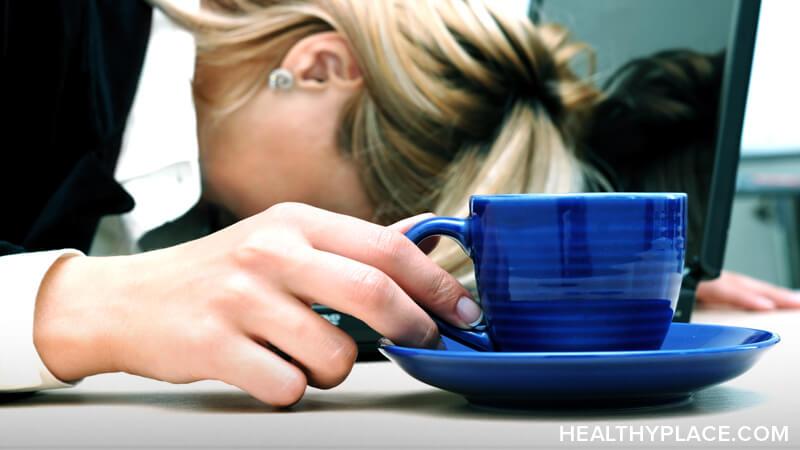Sleep Deprivation with Posttraumatic Stress Disorder (PTSD)

Sleep deprivation is a common complaint among people who experience posttraumatic stress disorder (PTSD). Research shows that at least 50% of individuals with PTSD have experienced recurring nightmares, and the majority of people with PTSD report either difficulty falling asleep (sleep onset insomnia), or trouble staying asleep long enough to feel rested (maintenance insomnia). Even though sleep difficulties often accompany PTSD, their importance might be underrepresented. Knowing how to recognize the symptoms of sleep deprivation and how to manage them are useful tools in treating the symptoms of PTSD.
Signs of Sleep Deprivation as Part of Your PTSD
I have a terrible habit of pushing myself to the edge of my sleep deprivation limits when I am stressed. This behavior usually results in a week of frantic attempts to accomplish a variety of tasks, followed by sleeping through Saturday entirely and feeling groggy on Sunday. It is an area I have targeted for personal improvement in managing my PTSD symptoms.
Some behaviors, such as falling asleep at work, or finding yourself unable to stay awake at the dinner table, are easy to identify. However, if you're like me, you might not realize that the symptoms below are also signs of poor sleep quality:
- Avoiding the scale - Are you feeling hungry or craving sweets more often? A lack of sleep can slow your metabolism. It can also increase cravings for sweet foods and make it difficult to know when you are full. Some studies are even beginning to look for a connection between sleep deprivation and diabetes.
- Catching every cold that goes around - A lack of sleep slows down the body's ability to create antibodies to fight off illness.
- Finding that stress is everywhere - The less you sleep, the more stressed you become, and your cortisol levels rise. This cycle makes it even more challenging to get to sleep.
- Not being able to even pick out socks - You have difficulty making choices, especially if you need to do so quickly. Your impulsivity increases. These are the days an unopened container of ice cream in the freezer is the most dangerous.
- Not being able to remember what you ate for breakfast - You space out over things that you usually remember. You might begin to wonder if you have a severe problem with your memory. The brain needs sleep to pay attention to details and solidify memories.
- Eyes playing tricks on you - You experience blurred or cloudy vision at times, especially when feeling tired.
- Muscles refusing to sleep - You notice that even while resting in bed, you are clenching your muscles. You may have your hands clenched or experience tension in your legs, back, or arms. Some people even feel tension in their facial muscles.
What You Can Do to Improve Sleep and Calm PTSD Symptoms
There are many strategies and remedies for improving sleep. With PTSD, most suggestions center around creating an environment, routine, and mental state that is consistent and relaxing. Here are some ideas:
- Journaling - Writing can help you relax and put your day in perspective, helping you to set aside those ruminating thoughts that might usually keep you awake.
- Massage - This is especially helpful if you find yourself frequently tense. Massage not only relaxes the muscles but can also help to decrease anxiety and depression.
- Bedtime routines - Our bodies respond well to consistent bedtimes and wake times. Also, we become used to the cues of a bedtime routine (shower, snack, read, etc. ) helping us prepare for sleep.
- Extra time for sleep - If you find yourself waking during the night and unable to fall back to sleep for an hour or longer, consider going to bed earlier to account for hours you are awake in the middle of the night. This extra time also helps ease the mental stress of worrying that you won't get enough sleep.
- Imagery - Save your pleasant thoughts and ideas for revisiting and planning at bedtime. This imagery helps calm the mind and ease bodily tension.
- Masking sounds - White noise, brown noise, pink noise, fans, clocks, or even washing machines have been reported to help people drown out nighttime sounds and sleep more soundly.
- Lighting changes - Use only soft, low lighting in the evening and at bedtime. If you use a phone or tablet while in bed, consider using an application or overlay to change the screen of your device to a softer or tinted light. Blue is a recommended color for encouraging sleep.
- Talk to your doctor - There are medications and supplements available that can help with persistent sleep concerns. These needs are best discussed with your physician, along with your diagnosis of PTSD.
Sources
- Anxiety And Various Sleep Problems. (n.d.). Retrieved December 13, 2017, from https://www.calmclinic.com/anxiety/symptoms/sleep-problems
- Kryger, MH et al. "Principles and Practice of Sleep Medicine." ExpertConsult, 5th edition, 2011, pp. 1481-1483.
- Muscle Tension and PTSD Relief. (n.d.). Retrieved December 13, 2017, from https://aehuppert.wordpress.com/tag/muscle-tension/
- Schubert, K. (2017). Improve sleep: 20 quick techniques with 3 extra solutions for jet lag. Center City, MN: Hazelden Publishing.
- Sleep and PTSD. (2007, January 01). Retrieved December 13, 2017, from https://www.ptsd.va.gov/public/problems/sleep-and-ptsd.asp
APA Reference
Hollowood, T.
(2017, December 13). Sleep Deprivation with Posttraumatic Stress Disorder (PTSD), HealthyPlace. Retrieved
on 2026, January 24 from https://www.healthyplace.com/blogs/traumaptsdblog/2017/12/posttraumatic-stress-disorder-and-sleep-deprivation
Author: Tia Hollowood
Blue light is NOT a good color to encourage sleeping. Red light is better, as it has a higher wavelength. Our bodies are conditioned to wake up to daylight and get sleepy at dusk.